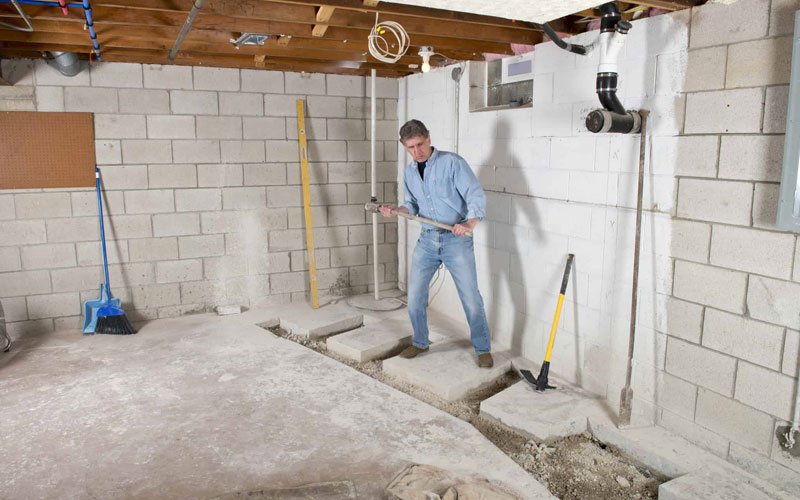
Basement foundation cracks aren’t merely cosmetic concerns. Over time, they can evolve into major structural issues, impacting the safety and value of your home. Recognizing the signs of foundation damage early can help homeowners avoid the need for extensive and expensive repairs. Visible cracks in walls or exterior bricks, sticking doors or windows, and uneven or sloping floors are all warning signals of a shifting foundation.
Extend Life of Home
The structural integrity of your home’s foundation is essential to its safety and value. Over time, environmental factors and water infiltration can weaken your basement’s foundation and cause damage throughout the entire house. Inspecting your basement for signs of damage and addressing them promptly through expert basement foundation repair can prevent extensive damage and extend the life of your home.
Minor issues, such as a slight sag in the floor or a crack in your basement wall, might seem insignificant. However, if you find doors that no longer open easily or gaps developing around windows, it’s important to have these problems assessed immediately. These minor signals may indicate larger issues that could threaten the integrity of your home’s foundation.
Bowed walls and cracks in your basement’s foundation are alarming indicators of serious external pressures that must be addressed immediately. Bowing walls are often caused by soil expansion or hydrostatic pressure. These issues can exceed the strength of internal load-bearing walls, causing them to collapse or lean at the basement level.
Many basement waterproofing solutions are designed to address these issues, such as installing a French drain or footing drains to collect and redirect water away from the home’s foundation. Proper slope grading can also help reduce soil moisture that can weaken the concrete slab and foundation.
Signs of Foundation Issues
Foundation problems will affect every aspect of your home if they are addressed slowly. They can damage floors, walls, ceilings, doors and windows, cabinets, plumbing, electrical wiring, heating and cooling systems, and more. A sagging, sinking foundation can also be a gateway for pesky rodents and pests to infest your home. Mold and mildew are early warning signs of excessive moisture that can cause serious damage to your property and your health. If you notice cracks forming in the basement or throughout the house, sagging or sinking floors, or bowing walls, call for foundation repair services immediately. The longer you wait, the more expensive the repairs will be.
A good time to schedule foundation repair is winter when soil conditions are colder and less wet. Wet seasons can contribute to foundation settlement when water seeps into the basement and causes major damage. In addition, weeds growing around the foundation are another early warning sign that moisture is damaging the foundation. Having a foundation drainage system installed will help to manage moisture and reduce the risk of foundation damage. A professional waterproofing contractor can evaluate your property and recommend the best system. Regularly cleaning gutters and extending downspouts will also help to control water flow away from the foundation.
Detecting Cracks
The concrete walls of a basement and crawl space support the entire weight of your home, so any cracks that form in them require careful attention. However, not all cracks indicate a serious structural problem.
Often, vertical cracks in basement foundation walls occur because of building settlement over time. These cracks tend to look jagged, but they don’t pose a threat to the home’s structural integrity unless they widen.
Diagonal cracks in basement foundation walls typically result from the concrete shrinking as it cures. These natural cracks don’t threaten the structure of your home, but they should be repaired with a concrete crack filler to keep moisture and soil smells out.
If you notice cracks in the concrete floor of your basement or crawl space, have them repaired as soon as possible to prevent a tripping hazard. Floor cracks may also be caused by heaving soil, which can cause the part of the basement slab that’s less supported to sink. Lastly, watch for horizontal cracks in your basement foundation that span the width of a wall. These cracks are usually a sign of significant pressure, especially in homes built on a concrete slab foundation.
Preventing Water Damage
If you can catch foundation damage early, you can limit the damage and save yourself money. A professional waterproofing contractor can inspect your home and determine the causes of basement water intrusion, whether it’s a result of plumbing leaks, soil erosion, or structural issues with the foundation itself.
The most common and easily preventable cause of basement moisture intrusion is surface water that can’t drain away from the home. This can occur due to poorly graded landscaping and soil erosion around the house, which can cause water to pool near the foundation. Keeping gutters clean and extending downspouts to channel water at least 6 feet from the foundation can prevent this problem.
A more serious issue can be attributed to plumbing leaks within the home. Leaks can spread quickly through porous building materials, such as drywall and carpeting, to reach the foundation, leading to basement flooding and seepage.







